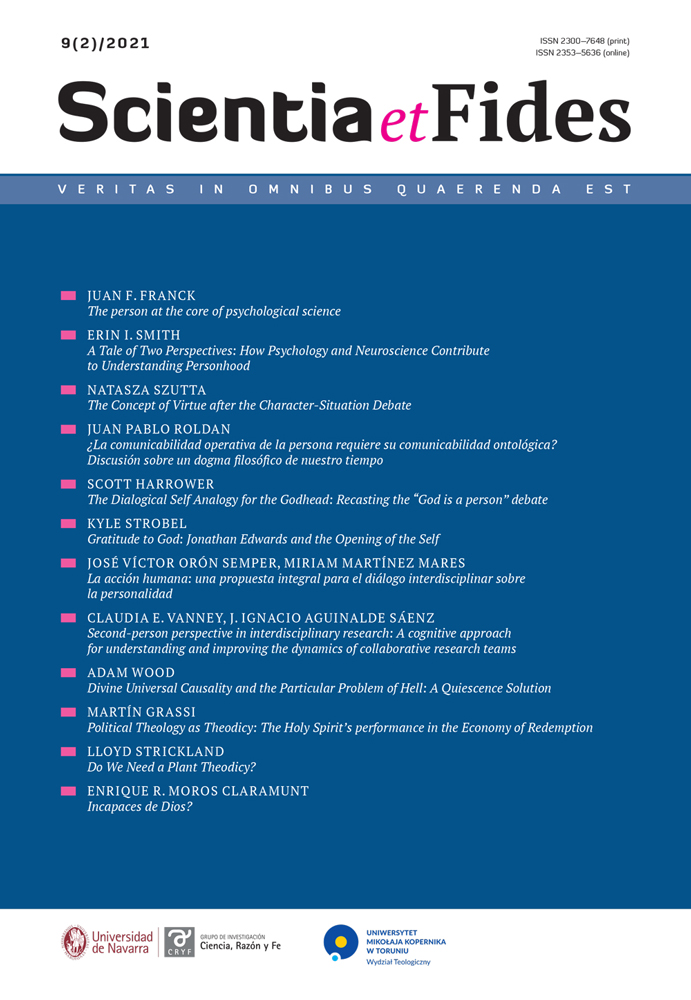¿La comunicabilidad operativa de la persona requiere su comunicabilidad ontológica? Discusión sobre un dogma filosófico de nuestro tiempo
DOI:
https://doi.org/10.12775/SetF.2021.019Keywords
person, substance, intersubjectivity, metaphysics, postmetaphysics, phenomenologyAbstract
Does the Operative Communicability of the Person Require his Ontological Communicability? Discussion on a Philosophical Dogma of our Time
The idea that a substantialist and individualistic philosophy of the person has permeated all of Western metaphysics and has been an obstacle to thinking about communion and intersubjectivity, has become commonplace in contemporary thought. This perspective is problematized here. It is suggested that the different formulations of it, though varied, obeyed a similar argument and dependence on closely related theoretical foundations. This approach is compared with that of ontological personalism and the results of the so-called "post-metaphysical" attempt to achieve a philosophy of communion that overcomes humanism. Interaction with various authors such as Schopenhauer, Nietzsche, Freud, Heidegger, Foucault, Vattimo, Esposito, Butler, Scheler, among others, illustrate the debate.
References
Adorno, Theodor, y Max Horkheimer. 1998. Dialéctica de la Ilustración. Fragmentos filosóficos. Madrid: Trotta.
Bloom, Paul. 2016. Against empathy: The case for rational compassion. New York: Harper Collins.
Butler, Judith. 2009. Dar cuenta de sí mismo. Violencia ética y responsabilidad. Buenos Aires: Amorrortu.
Crosby, John. 1996. The Selfhood of the Human Person. Washington DC: CUA Press.
Deleuze, Gilles y Guattari, Félix. 1985. El Anti Edipo. Capitalismo y esquizofrenia. Barcelona: Paidós.
Derrida, Jacques. 1986. De la gramatología. México: Siglo XXI.
Esposito, Roberto. 2009. Tercera persona. Política de la vida y filosofía de lo impersonal. Buenos Aires: Amorrortu.
Foucault, Michel. 2009. El gobierno de sí y de los otros. Curso en el College de France: 1982–1983. Buenos Aires: Fondo de Cultura Económica.
Foucault, Michel. 2010. El coraje de la verdad: El gobierno de sí y de los otros II. Curso en el College de France: (1983–1984). Buenos Aires: Fondo de Cultura Económica.
Foucault, Michel. 1994. “L´éthique du souci de soi comme pratique de la liberté.” En Dits et écrits (1954–1988), t. lV (1980–1988). Paris: Gallimard.
Freud, Sigmund. [1917] 2003. “Una dificultad del psicoanálisis.” En Obras Completas. Tomo III. Traducido por Luis López-Ballesteros y de Torres, 2432–2436. Buenos Aires: El Ateneo.
Giacon, Carlo. 1946. La Seconda Scolastica. v. II. Precedenze teoretiche ai problemi giuridici. Toledo, Pereira, Fonseca, Molina, Suárez. Milano: Fratelli Bocca.
Heidegger, Martin. 2000. Carta sobre el humanismo. Madrid: Alianza.
Heidegger, Martin. 2013. Nietzsche. Barcelona: Ariel.
Heidegger, Martin. 1997. Ser y tiempo. Traducido por Jorge Eduardo Rivera C. Santiago de Chile: Editorial Universitaria.
Herman, Arthur. 1998. La idea de decadencia en la Historia Occidental. Barcelona: Andrés Bello.
Kant, Immanuel. [1803] 2009. Sobre pedagogía. Córdoba: Universidad Nacional de Córdoba – Encuentro Grupo Editor.
Pinker, Steven. 2018. En defensa de la Ilustración. Por la razón, la ciencia, el humanismo y el progreso. Barcelona: Paidós.
Pinker, Steven y Paul Bloom. 1990. “Natural language and natural selection.” Behavioral and brain sciences 13: 707–784.
Ricoeur, Paul. 2006. “La identidad personal y la identidad narrativa.” En El sí mismo como otro. México: Siglo XXI.
Roldán, Juan Pablo. 2019. “Tres momentos, una idea. Un concepto filosófico acerca del desarrollo del ser humano presente en la psicología contemporánea”. Humanidades: revista de la Universidad de Montevideo 5: 53–79
Scheler, Max. 2003. El puesto del hombre en el cosmos. Buenos Aires: Losada.
Scheler, Max. 2004. Esencia y formas de la simpatía. Buenos Aires: Losada.
Schopenhauer, Arthur. 2008. El mundo como voluntad y representación. Buenos Aires: Losada.
Stein, Edith. 1998. La estructura de la persona. Madrid: BAC.
Vattimo, Gianni. 1996. Creer que se cree. Buenos Aires: Paidós.
Vattimo, Gianni. 1986. “El ocaso del sujeto y el problema del testimonio.” En Las aventuras de la diferencia. Pensar después de Nietzsche y Heidegger, 43–59. Barcelona: Península.
Vattimo, Gianni. 2004. Después de la cristiandad: por un cristianismo no religioso. Buenos Aires: Paidós.
Vattimo, Gianni. 2001. “Valores, consenso y «pensamiento débil». La fe en la libertad.” Clarín. https://aprendizaje.mec.edu.py/dw-recursos/system/content/0c59c97/content/Vattimo,%20Gianni%20(1936-XXXX)/Vattimo,%20Gianni%20-%20El%20pensamiento%20d%C3%A9bil.pdf
Downloads
Published
How to Cite
Issue
Section
License
Copyright (c) 2021 Scientia et Fides

This work is licensed under a Creative Commons Attribution-NoDerivatives 4.0 International License.
CC BY ND 4.0. The Creator/Contributor is the Licensor, who grants the Licensee a non-exclusive license to use the Work on the fields indicated in the License Agreement.
- The Licensor grants the Licensee a non-exclusive license to use the Work/related rights item specified in § 1 within the following fields: a) recording of Work/related rights item; b) reproduction (multiplication) of Work/related rights item in print and digital technology (e-book, audiobook); c) placing the copies of the multiplied Work/related rights item on the market; d) entering the Work/related rights item to computer memory; e) distribution of the work in electronic version in the open access form on the basis of Creative Commons license (CC BY-ND 3.0) via the digital platform of the Nicolaus Copernicus University Press and file repository of the Nicolaus Copernicus University.
- Usage of the recorded Work by the Licensee within the above fields is not restricted by time, numbers or territory.
- The Licensor grants the license for the Work/related rights item to the Licensee free of charge and for an unspecified period of time.
FULL TEXT License Agreement
Stats
Number of views and downloads: 931
Number of citations: 1



